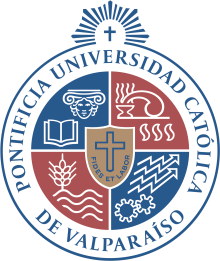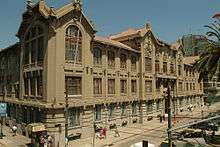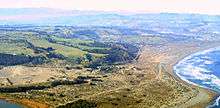Pontifical Catholic University of Valparaíso
The Pontifical Catholic University of Valparaiso (Spanish: Pontificia Universidad Católica de Valparaíso) (PUCV), also known as Universidad Católica de Valparaíso (UCV), is one of six Catholic universities in Chile and one of the two pontifical universities in the country, along with the Pontifical Catholic University of Chile. It is located in Valparaíso, Chile and has approximately 14,000 students.
Pontificia Universidad Católica de Valparaíso (Spanish) | |
 Pontifical Catholic University of Valparaíso coat of arms | |
Other name | PUCV; UCV |
|---|---|
Former name | Catholic University of Valparaíso |
| Motto | Fides et labor (Latin) |
Motto in English | "Faith and work" |
| Type | Private, Traditional |
| Established | 15 March 1928 (92) |
Religious affiliation | Catholic Church |
| Budget | CLP$ 61,879,000,000 (year 2013) |
| Chancellor | Mgr. Gonzalo Duarte García de Cortázar SS.CC. |
| Vice-Chancellor | Pbr. Dietrich Lorenz Daiber |
| Rector | Claudio Elórtegui Raffo |
| Secretary-General | Juan Carlos Gentina Morales |
Academic staff | 1341 |
| Students | 14 923 |
| Undergraduates | 13 520 |
| Postgraduates | 1403 |
| 327 | |
Other students | 851 (International student exchange) |
| Location | , Region of Valparaíso , 33°2′41″S 71°36′20″W |
| Campus | Urban 255 089 m² of land 143 817 m² built |
| Language | Spanish |
| Colors | Dark blue Dark red Golden |
| Website | pucv |


PUCV attracts students from different areas of Chile, as well as hundreds of exchange students from Europe, North America and several countries from South America, due to its convenient student exchange programs. It is recognized as a traditional institution with high academic prestige and as a complex university due to its important research and educational development in the fields of science, engineering, humanities and arts. As a Catholic university, it answers directly to the Holy See and the Bishopric of Valparaíso. It is a private university with state support.
PUCV is an urban university. It has a central campus known as Casa Central (Central House) located in downtown Valparaíso, only a few blocks away from the Chilean Congress, the Metro, and the Pacific Ocean. One of the drawbacks of being an urban university is the difficulty of growing at the original site of its foundation. Several PUCV buildings are on the historic palm-tree-lined Avenida Brasil, but most of its schools are dispersed in throughout Valparaíso, Viña del Mar, Quilpué and Quillota.
It was positioned 29th at the QS Latin America University Ranking 2014 (5th nationwide).[1] At the 2014 edition of the América Economía magazine university ranking, it was positioned 5th nationwide and first in the Region of Valparaiso.[2]
Profile
The UCV offers undergraduate degrees in more than 50 subjects, including architecture, design, horticulture, industrial engineering, business, law, accounting and finance and spanish.
The school of architecture, also called "The Valparaíso School" in architectural circles, constructed an experimental city called the Open City, a few kilometers North of Valparaíso, where the professors teach and live in the houses that they and the students design and build. PUCV architects have a reputation for being highly creative, having studied at a school that mixes the architectural design and building processes with poetry and physical activities. Similarly, in the Quillota campus the program in horticulture is offered within an experimental station. This campus is visited by more than 1,500 people each year, and has outstanding collections of subtropical and temperate fruit trees, a nursery. The station of 500,000 square metres has more than 50,000 square metres of greenhouses.
The diversity of the PUCV is one of its strengths, with a rainbow trout farm near Los Andes, a legislative consultancy group (CEAL), a farm in Quillota with an area of 6 km², a fruit packing house specialized in avocados and citrus fruits (joint venture with Exportadora Santa Cruz), a TV station, that has been on the air since 1957 (the first in the country), a radio station, a publishing house, and an experimental grade school and high school for boys in Viña del Mar. All of these units welcome interns and scholars, both from PUCV and other universities.
The PUCV houses the editorial offices of journals in marine biology, law, religion, philosophy, psychology, and biotechnology. Explora, a special government program to promote science in primary and secondary schools, is also hosted by the PUCV.
History
It was founded in March 1928, supported by the generous contribution of Isabel Caces de Brown. Even older, the Law School was established in 1894 as an independent college by the Sacred Heart Fathers, and was later incorporated into the University (since both were units of the Roman Catholic Church). The first undergraduate majors offered by the PUCV were electrical engineering, construction, chemistry, mining, business administration, mechanical engineering, decorative arts, and merchant marine studies.
The Pontifical title was conferred by Pope John Paul II and announced at the inauguration of the 2003 academic year by Zenon Grocholewski, Cardinal Prefect of the Congregation for Catholic Education.
Administration
PUCV is a private institution dependent upon the Roman Catholic Church. As some other old private universities in Chile, PUCV receives some funding from the Chilean government. PUCV's Grand Chancellor is the Bishop of Valparaíso, who appoints representatives in the Academic Council but does not directly run the University (responsibility of a faculty-elected Rector). The Council includes the Deans of each faculty, all of whom are elected by the faculty.
The appointment of PUCV officers and structural changes in its administration need the approval of the Holy See, with periodic reviews by the Congregation for Catholic Education of the Roman Curia. Doctoral honoris causa degrees need to be approved by the Congregation.
Faculties and undergraduate programs
Currently, PUCV has 63 undergraduate programs, 15 doctorate programs, 35 master programs and 82 other postgraduate programs.
- Faculty of Architecture and Urbanism
- Faculty of Agriculture
- Fruit Science, Vegetable Crops and Ornamentals, Environmental Management, Food Technology
- Faculty of Science
- Mathematics, Statistics, Biology, Physics, Chemistry
- Faculty of Economic and Management Sciences
- Management, Accounting Auditing, Social Work, Journalism
- Faculty of Engineering
- Biochemical Eng, Chemical Eng, Civil Eng, Computing Eng, Construction Eng, Electrical and Electronic Eng, Industrial Eng, Mechanical Eng, Transportation Eng,
- Faculty of Law
- Faculty of Natural Resources
- Geography, Oceanography, Aquaculture and Fisheries
- Faculty of Philosophy and Education
- Philosophy, Psychology, Education, Special Education, Physical Education, History, Spanish and English, Music
- Ecclesiastical Faculty of Theology – Institute of Religious Studies
- Religious Studies
International relations
PUCV has a long history of academic relations with institutions all over the world, with more than 260 agreements concentrated in European universities. Student exchange is most active with universities of Spain, US, France, Germany; a few students are from countries in Latin America. The list of institutions includes some of the oldest universities in the world, such as Université catholique de Louvain (founded in 1425 by Pope Martin V), Università di Pisa (founded in 1343 by Pope Clement VI) and Ruprecht Karl University of Heidelberg.
Notable alumni
- Bishop Carlos Camus, a human rights leader during Augusto Pinochet's dictatorship.
- Alejandro Foxley, economist and politician, Foreign Affairs Minister in Michelle Bachelet's government.
- Jorge Martínez Busch, former commander-in-chief of the Chilean Navy, as well as an appointed senator in the Senate of Chile from 1998 to March 2006, when a reform of the Constitution of Chile put an end to non-democratic senators.
- Amable Padilla, former Ambassador of the Dominican Republic to Chile
- Ricardo Ezzati Andrello, Archbishop of Santiago.
References
- "QS University Rankings: Latin America 2014". Quacquarelli Symonds. Retrieved 11 May 2015.
- "Ránking Universidades de Chile 2014". América Economía. Retrieved 11 May 2015.
External links
| Wikimedia Commons has media related to Pontifical Catholic University of Valparaíso. |
.jpg)